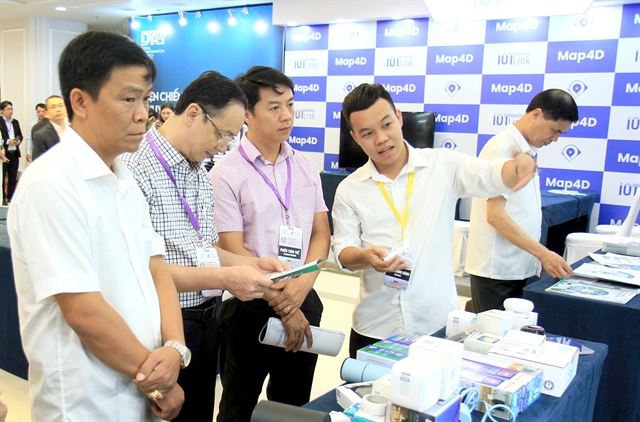 Economy
Economy

 |
| Delegates visit Rạng Đông Smart Home booth at the exhibition held within the framework of the forum. — VNA/VNS Photo Thái Thuần |
NAM ĐỊNH — The fourth industrial revolution, which includes digital transformation, digital economic development, and the rise of a digital society and government, is a key driver for both global and national economic advancement.
Trần Tuấn Anh, a Politburo member and Chairman of the Party Central Committee's Commission for Economic Affairs, made the statement at the inaugural National Forum on Digital Economy and Society Development in Nam Định City, northern province of Nam Định, on Thursday.
The forum was co-chaired by the Ministry of Information and Communications (MIC), the Central Economic Commitee (CEC) and the People’s Committee of Nam Định Province to realise the goals and mobilise initiatives to contribute to the development roadmap of the digital economy and society in Việt Nam.
With the theme "Bringing Digital Platforms to the Household", the event aims to become an annual exchange for State management agencies, businesses, and leading industry experts focusing on digital economy and society development in Việt Nam in accordance with Resolution 52 of the Politburo.
The contribution of the digital economy to GDP was increasing, said Anh.
According to MIC estimates and reports, the proportion of the digital economy in GDP has increased from 11.91 per cent in 2021 to 14.26 per cent last year and reached about 14.96 per cent in the first six months of this year.
The e-Connomy SEA annual digital economy report researched by Google and Temasek announced that Việt Nam's digital economic growth rate was 28 per cent last year, leading among Southeast Asian countries.
There were more than 1,400 Vietnamese digital technology enterprises last year with revenue from foreign markets, a year-on-year increase of nearly 20 per cent.
Investment in digital infrastructure rose, many digital platforms continued to be developed. Sixty mobile platforms and applications serving the people of Việt Nam have over 1 million monthly users, an increase of nearly 10 per cent compared to the same period last year.
The total number of monthly users on Vietnamese mobile applications exceeded 500 million in the first six months of this year, rising nearly 16 per cent year-on-year.
In addition, a new bright spot in digital society development in localities in the first six months of this year is that some provinces have had the number of payment accounts opened at banks or other licensed organisations exceed the average population level of the province, including Thái Nguyên, Ninh Bình, Quảng Nam, Quảng Ngãi, Đắk Nông, Long An, and Kiên Giang.
On behalf of the Party and State leaders, the Chairman of the Party Central Committee's Commission for Economic Affairs acknowledged, praised and appreciated the efforts, determination and results achieved by all levels, sectors, localities, the business community and people, making an important contribution to the national digital transformation, the development of our digital economy and society.
"The results achieved are very positive, but the practice of developing the digital economy and digital society in recent times is still facing many challenges," said Anh.
The number of national digital platforms in widespread use remains limited. The human resources available for digital transformation fall short in both quantity and quality, he highlighted.
There are numerous potential threats related to legal matters, cyber security, and user privacy; the general populace is not entirely prepared for the digital economy.
The establishment of a regulatory framework to test new technologies, products, services, and business models emerging from the fourth industrial revolution has been sluggish.
The target set out in the 13th National Party Congress Resolution, the National Digital Transformation Programme, and the Digital Economy and Society Development Strategy is to have the digital economy contribute to 30 per cent of GDP by 2030.
It's a lofty and formidable objective, necessitating a groundbreaking approach and strategy for Việt Nam to execute, Anh remarked.
Minister of Information and Communications Nguyễn Mạnh Hùng, said: “The objective of digital economic growth is to increase the wealth of citizens. The purpose of cultivating a digital society is enhancing the happiness of the populace through digital technology.”
Developing the nation's digital economy demands the establishment of digital institutions, infrastructure, and trust, the minister indicated.
A thriving digital economy should foster digital innovation, integrate the digital economy across all sectors and domains, promote digital governance and bolster digital skills, human resources, and notably draw in digital expertise.
The framework for advancing the Vietnamese digital economy rests on three tenets: digital governance; harnessing data to bolster the economy; and nurturing the production sectors connected with the digital economy, Hùng explained.
Concurrent to the forum, a tech application showcase for promoting the digital economy is taking place, featuring top-tier IT solution providers like Viettel, VNPT, Misa, Mobifone, FPT, Shopee, and VNPay.
Prominent solutions presented at the exhibition encompass digital payment/e-wallet systems, EMV and non-EMV payments, NFC (Near Field Connectivity), mobile payment mechanisms, digital signatures, blockchain innovations, e-commerce, digital ecosystems, and data protection. — VNS




